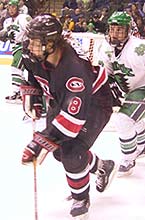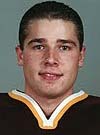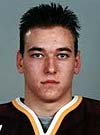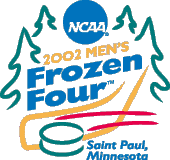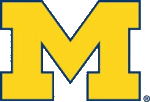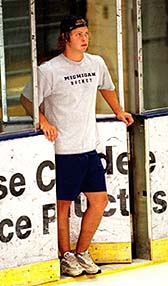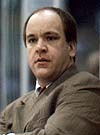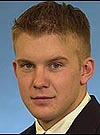College Hockey America has made a significant step toward receiving an automatic bid to the NCAA men’s tournament, thanks to a ruling by the NCAA Management Council at a recent meeting.
The Council corrected a mistake made two years ago, when the NCAA erroneously returned the CHA’s membership application and fee. At the time, the CHA had six schools, plus Findlay, a provisional member. The number of full-fledged NCAA schools dropped to five, however, when Army left for the MAAC, which confused the process.
However, the NCAA ruled that a conference can maintain its Division I status while counting a provisional member as one its six schools. Since the conference should have been approved to begin with, it is allowed to continue as an NCAA conference despite having only five full-fledged NCAA institutions. That decision was made retroactive to Sept. 1, 1999.
Much of the credit for getting the NCAA to move on the issue is being given to Bob Peters, the recently-retired long-time coach at Bemidji State, who is also incoming CHA commissioner. After attending July’s annual NCAA Men’s Ice Hockey Committee meetings, he stayed near the NCAA headquarters in Indianapolis to try to push the situation.
“If not for Bob, we never would’ve gotten this done,” said Bill Wilkinson, outgoing chair of the NCAA Men’s Ice Hockey Committee and head coach at Wayne State, a CHA member. “He stuck around Indianapolis and got his nose in the situation. He was getting people to recognize that we got the paperwork in accordingly.”
Now the CHA must get on with solidifying its six teams. Once it has six NCAA members in its ranks, the conference is expected to get the automatic bid. Findlay is on track to become that team, once its probationary period ends after this coming season.
Assuming nothing else changes, the CHA would theoretically have an automatic bid for the 2003 NCAA tournament.
Another major monkey wrench, however, is the possibility of Niagara moving from the CHA to the MAAC, where it participates in all other sports. That would again give the CHA less than the six requisite members.
Though talk of this move died down over the past year, especially after coach Blaise MacDonald departed for UMass-Lowell, the possibility has apparently heated up again, with the MAAC pushing harder than ever.
“It’s always a worry. We don’t want to lose members,” said Wilkinson. “The MAAC people are pushing. But to be affiliated in basketball is different than being affiliated in hockey. We feel that with hockey, the CHA has been more progressive [than the MAAC].”
Wilkinson said the Niagara situation is, at this time, a year-to-year thing and CHA schools have never been forced to give lengthy committments. Therefore, it’s hard to say with complete confidence that the conference will be in tact when it comes time for the committee to render a decision next summer.
Jack McDonald, incoming committee chair and athletic director at Quinnipiac, said the committee will make the determination on the CHA’s qualifications when the time comes.
“If the NCAA allows their application to get to our table, they should get an AQ,” said McDonald.
Though there is nothing preventing the CHA from attempting to make a run at it one year early.
“The MAAC was eligible two years ago. We applied a year early and it was denied,” said McDonald. “There was no hard feelings. It helped us the following year.”
Of course, none of this wrangling over having six member schools would have mattered had the NCAA not granted the CHA conference status.
“It’s a great relief,” said Wilkinson. “We’ve done everyting correctly. Maybe it was an oversight on their part not ruling correctly in the first place, but it’s great to see the situation rectified.”
Findlay announced it was moving all of its sports from NAIA to NCAA Division II in August, 1998. Once the move to the NCAA was completed, the hockey program then started its own two-year probationary period for a move to Division I. That began in September, 2000.
Findlay’s progression to Division I status has been filled with confusion, and references to arcane NCAA by-laws.
Just as the school’s Division II status was reached, the NCAA passed a nine-year moratorium on new membership or teams moving up in classification. Findlay had to be granted an exemption in order for their move to D-I in hockey to continue.
Last season, the MAAC forced all league members to drop their scheduled games against Findlay, citing a conference by-law preventing teams from playing games against non-D-I opponents in their first probationary year. Many teams apparently thought Findlay was in its second probationary year. The MAAC’s decision angered many in the hockey community.
This season, MAAC teams have once again scheduled Findlay, now that the Oilers have finally reached their second probationary year.
Bowling Green coach Buddy Powers replaces Wilkinson on the committee, effective Sept. 1. The NCAA has also approved two new membership slots, bringing the total to six, one for each hockey conference that has an automatic bid, and one wild card.
